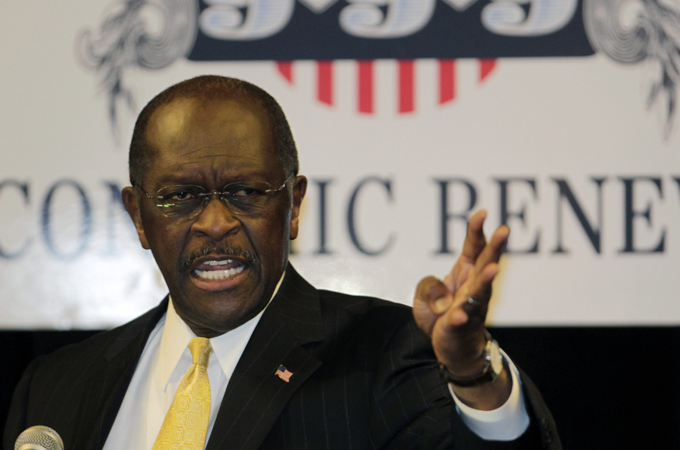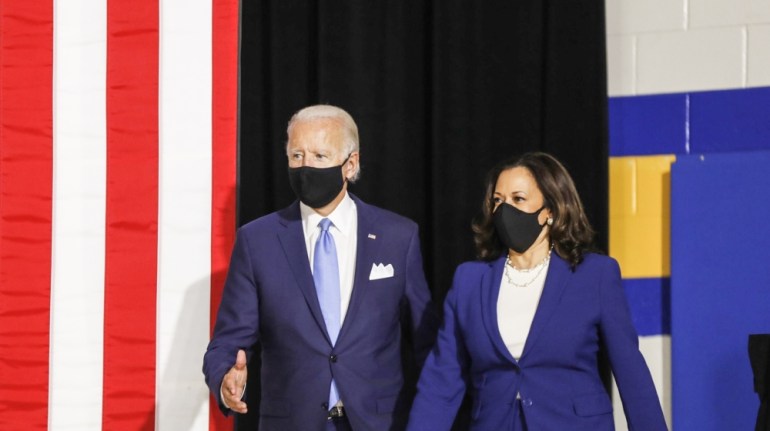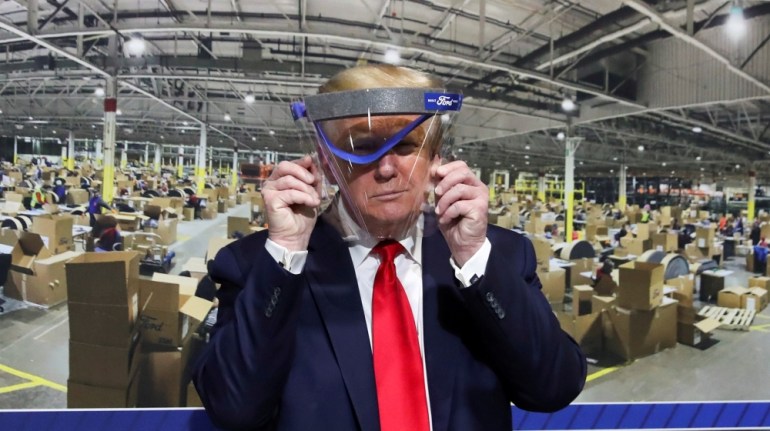Donald Trump repeatedly refused to wear a mask and mocked Biden
President downplayed the value of masks, refused to be seen wearing one, politicising safety as pandemic raged in the US.

From the beginning of the coronavirus outbreak in the United States, President Donald Trump has projected a cavalier attitude towards mask-wearing, refusing to wear a mask in public and mocking others who do.
Trump routinely appears without a mask as he carries on a high-risk campaign travel schedule of public rallies he sarcastically calls “peaceful protests” as he pushes to reopen the US economy to win re-election.
Keep reading
list of 4 itemsThe Take: Trump v United States
Witness testimony continues in Trump’s New York hush money trial
Six takeaways from Trump immunity hearing and New York hush money trial
“I wanted to always play it down,” Trump told The Washington Post columnist and author Bob Woodward that after learning of the risks to the US of the virus earlier this year.
“I still like playing it down because I don’t want to create a panic,” the president told Woodward in March.
In keeping with his theme of downplaying the virus, Trump has repeatedly dismissed the value of wearing masks in his public statements and appearances despite health officials’ recommendations that masks are essential to stem the spread of the virus.
In his stump speeches at recent airport rallies, attended by large crowds of several thousand supporters – most of them without masks, Trump has criticised his Democratic rival, Joe Biden, for remaining close to home in Delaware and showing great caution.
“Every time you see him, he’s got a mask. He could be speaking 200 feet away from them, and he shows up with the biggest mask I’ve ever seen,” Trump said at Tuesday’s presidential debate with Biden in Cleveland, Ohio.
Questioned by moderator Chris Wallace, Trump said he wears a mask “when needed” but equivocated that even Dr Anthony S Fauci, the nation’s top infectious disease expert, had initially advised, “masks are not good” and “changed his mind” later.
Biden always wears a mask in public and has limited his few campaign events to small numbers of people observing local social distance requirements that Trump has flouted.
On September 25, several thousand supporters attended a Trump rally in Newport News, Virginia where the governor has banned public gatherings of more than 250 people.
The president claims there has been no fallout from his rallies. “We’ve had no negative effect. And we’ve had 35-45,000 people at these rallies,” he said in Tuesday’s debate. Both assertions are not true.
Refusing to wear a mask became a political statement for Trump supporters as early as June when the president held a large public rally in Tulsa, Oklahoma, with thousands of attendees who did not wear masks.

Herman Cain, a business executive and former long shot Republican presidential candidate, died on July 30 at the age of 74 of COVID-19 after attending the Tulsa event.
The rally “more than likely contributed” to hundreds of cases in Oklahoma, Dr Bruce Dart, the director of the Tulsa Health Department, said in July.
Trump has been repeatedly self-congratulatory about his response to the COVID-19 pandemic that has infected nearly 7.3 million people and killed more than 207,000 in the US.
But it has proved to be his biggest political vulnerability going into November’s election. Polls show broad public support – 80 percent to 90 percent – for wearing masks.
Biden has continually highlighted Trump’s response to the coronavirus during the campaign. Polls show most American voters disapprove of the president’s handling of the pandemic.
Trump has been “totally irrational” in his handling of the coronavirus pandemic resulting in the loss of thousands of lives, Biden said in a televised town hall on September 18.
“If the president had done his job from the beginning, all the people would still be alive,” Biden said at the event broadcast by CNN.
Trump failed to warn the American public about the serious risks of infection and has misled people about the value of wearing masks, Biden said.

“The idea that you’re going to not tell people what you’ve been told, that this virus is incredibly contagious, seven times more contagious than the flu … He knew it and did nothing is close to criminal,” Biden said.
Indeed, Trump has sidelined public health experts and the US Centers for Disease Control and Prevention (CDC) from leading the White House’s policy response seemingly in order to control the message his administration is sending the public.

In May, he was briefly required to wear a mask while visiting a Ford manufacturing plant in Michigan but took it off before he appeared in front of media cameras.
“I don’t want to give the press the pleasure of seeing it,” Trump said.
In June, the president did not wear a mask when he visited a medical swab manufacturing plant in Maine to tout increased production of testing supplies.
Asked at a White House briefing in August about the mixed message he was sending the public on masks, Trump offered a contradictory assurance.
“My administration has different approach. We have urged Americans to wear masks, and I emphasised this is a patriotic thing to do. Maybe they’re great, and maybe they’re just not so good,” he said.
At a White House news conference on September 7, the president demanded a reporter take off his mask to ask a question: “If you don’t take it off, you’re very muffled.”
More recently, Trump has gradually moderated his comments on mask-wearing. He has been seen wearing a mask with the presidential seal on it.

As a COVID-19 safety measure, Trump and Biden had agreed not to shake hands at the start of Tuesday’s debate in Cleveland.
On Monday, at the White House, Trump had announced the US government would begin distributing millions of rapid coronavirus tests to states this week and urging governors to use them to help reopen schools for students in kindergarten through 12th grade.
“Tremendous progress is being made,” Trump said on Monday. “And I say, and I’ll say it all the time, we’re rounding the corner. And, very importantly, vaccines are coming, but we’re rounding the corner regardless. But vaccines are coming, and they’re coming fast.”
Confirmed coronavirus cases in the US remain elevated at more than 40,000 per day and experts warn of a likely surge in infections during colder months ahead.
